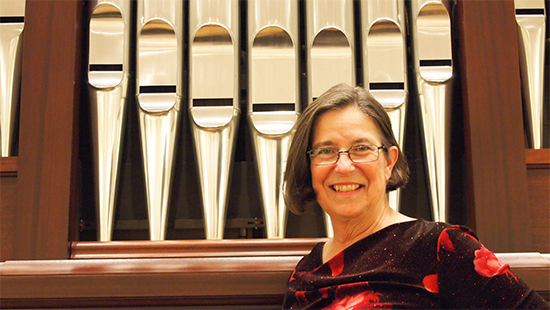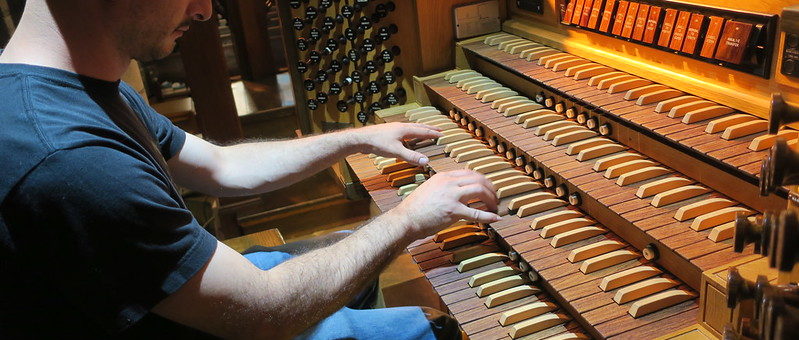by Daniel Hathaway

I caught up with the jovial recitalist in her Oberlin studio to talk about her wide-ranging selection of pieces, each of which comes with a story or a personal connection attached. Noting that she’s going to be playing settings of Vom Himmel hoch, In dulci jubilo, and Puer natus in Bethlehem, I suggested that she’s getting ready to celebrate Christmas early.
“Most organists do. Our heads are in the coming season and not really in the present. We’re all thinking about how we’re going to handle Advent and Christmas during the pandemic.”
Rakich said that her discovery of a piece by David Arcus, an Oberlin grad who went on to teach at Duke, was the springboard for the opening set of the program. “The builder of the organ at the Duke Divinity School on which I recorded my recent CD played a pirated tape for me of Arcus playing — and half improvising — a set of Variations on “Besançon.” I thought it was so cool that I contacted David and said, ‘Come on, write this out. I want to play it!’”
The tune is associated with the Advent words, ‘People, look East.’ “After that, I thought I should play at least one Christmas piece,” Rakich said, “and Bach’s Canonic Variations on ‘Vom Himmel hoch’ are near and dear to me. I’ve played them for a long time, and things kind of evolved from there.”
After the Bach, a highly sophisticated contrapuntal work the composer wrote in 1747 as part of his induction into Mitzler’s Music Society in Leipzig, Christa Rakich will turn to works by a more recent composer, Johanna Senfter (1879-1961).
“I pulled three Christmas chorales out of her collection of ten, and not the same ones I programmed on my CD. They’re quite different from one another. My favorite is the last one, which is in the form of a trio with a canon at the fifth. It sounds like Schoenberg — very snaky and spooky.”
You don’t hear music by Nadia Boulanger very frequently — she’s best known as a pedagogue. “Nadia was very self-disparaging as a composer, but based on her Trois Pièces (Prélude, Petit Canon and Improvisation), I wish she had written a whole lot more,” Rakich said.

“This was at the end of July, it was brutally hot with five or six days of temperatures over 90, and the central air conditioning broke. While shaking off my lethargy, I discovered that ‘Slane’ fit together pretty well with Summertime. How would it sound if I played one verse with Gershwin-y harmonies? I wrote it out, and by the time I finished, I thought, ‘Hey, this is a nice piece.’”
There’s also a story and a bit of sleuthing involved with Dutch composer Margaretha Christina de Jong’s Fantasia on ‘Salve Regina.’ “I saw her name for the first time in The American Organist’s list of new music, which included a work in the style of Duruflé, and thought, I’ve got to check her out.”
Rakich ordered the piece, learned it, and liked it a lot. “It really does sound like Duruflé, but without all the meandering.” But she had some questions about the score that only the composer could answer. “I Googled her, got in touch, we talked online, and she invited me to play a concert at her church in Middleburg in the Netherlands.”
The two hit it off, and de Jong asked Rakich what she’d like a piece written for her to sound like. “I told her that her music sounded very Germanic and Protestant. What if she pretended to be Catholic?” Rakich suggested a piece based on the over-the-top 12th-century chant Salve Regina, and de Jong complied. “When I got the score, I wrote to de Jong and declared her an honorary Catholic. You could almost smell the incense.”
Rakich will end her program with “Cape Cod” from James Woodman’s Sonata in Sea. “James was a student of mine back in the day. In 2003 I was asked to play for the regional convention of the Cape Cod chapter of the American Guild of Organists on a small Hook instrument of about twelve stops. They commissioned a piece from James, and he came up with these three movements each representing a town.
“The more inland town is Barnstable, a shopping port. Wellfleet is more mid- to upper Cape — where all the retired college professors live — and that movement is mesmerizing, as though you were sitting watching the waves. And ‘Provincetown’ is a quodlibet combining the Navy Hymn — a tribute to the Portuguese fishermen who worked there — and the English folk tune ‘John come kiss me now,’ a sly reference to the huge gay population in the summertime.”
Rakich says she has made friends with Trinity’s Berghaus organ, a famously robust instrument that has plenty of interesting colors to offer. “The organ has a recording device on it so you can go out in the room and listen to what you’ve done. I did a lot of trimming of my registrations as a result.”
Published on ClevelandClassical.com September 29, 2020
Click here for a printable copy of this article



